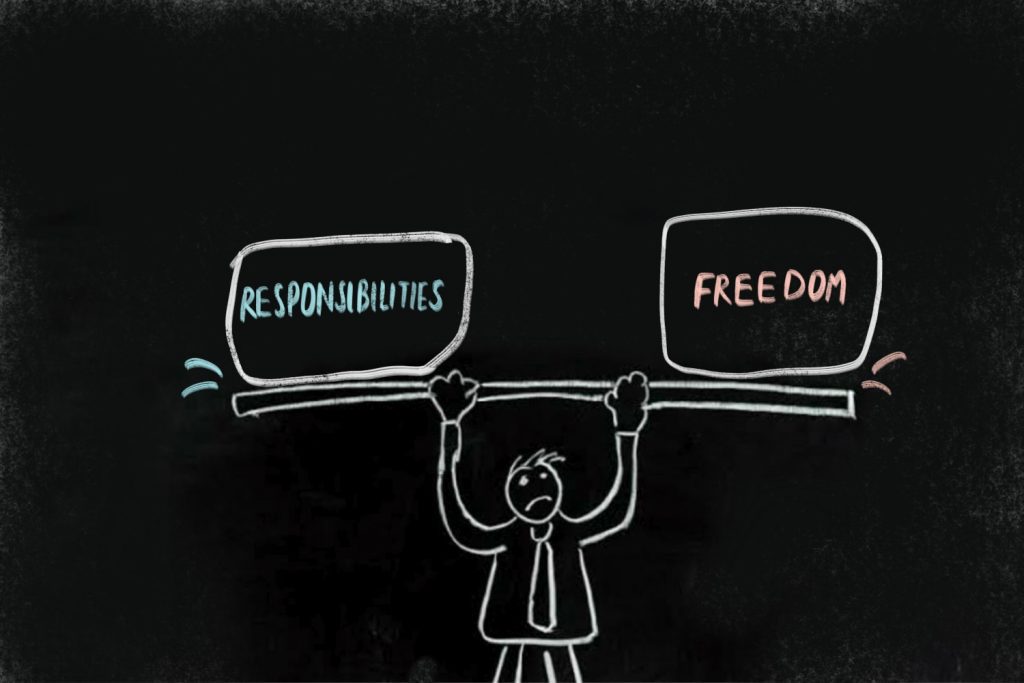Define Contrasting
Freedom and Responsibility are two fundamental concepts in the modern human society. However, there implementation often contradicts one another. Freedom can be considered subjective to responsibility and vice versa, and the combination of these concepts has a influential role in defining our perception. The objective of this text is to gain greater comprehension on both concepts through comparisons and deliberations.
All individuals have the right to freedom of movement and thought. An individual is permitted within the boundaries of law to make as many such movements as possible, at any given time or day. The individual can travel between cities, change houses, go outside etcetera. However, if the same individual were to have a family and children, his responsibilities would lessen his freedom right. Though the right to freedom is not diminished, but the commitment of having to provide for a family and take care of children lessens the possibility of his free movement.
The individual is bound to follow a set of routines obediently due to his responsibility – which is in contradiction to the principles of freedom. Nevertheless, responsibility can likewise be reduced if freedom is given greater precedence. The presence of responsibility wanes, but does not take away an individual’s right to freedom. The same father maintains the freedom to throw away all his present responsibilities and pursue life in a different course, but instead chooses not to due to personal and family responsibilities.
Thus, both compare and contrast thesis of these ideas are exercised on an individual’s volition, which can be considered a freedom on its own. It is up to the individual to give preference to either of these ideas, based on their perceptions, though a number of other factors such as background culture and upbringing. Legal responsibilities – such as written contracts, oral contracts, employment and other legal procedures do induce a precedence on the individual’s freedom. Freedom of an individual cannot be subjected by another individual – yet if a person were to take out a loan, he/she would be obliged to return it within its due course.
No volume of freedom would permit an excuse in this regard. A responsibility has to be fulfilled when it comes onto legal matters, taking precedence over freedom. As legal matters are involved, a failure to meet on the responsibilities will lead to diminished of some other, or all freedoms, i.e. being sent to jail. A soldier in service to the military is bound under responsibility to fulfill his duties.
The responsibility outweighs his freedom because the individual prizes the responsibility over his freedom. In grim times, such as conflict or war, the soldier’s responsibility and freedom are put to the test, as the soldier can either flee to preserve his freedom, or withstand and face the enemy in fulfillment of his responsibility. Both actions bring about considerable repercussions – the soldier could face imprisonment or death on either option.
There is other possible alternative in this scenario, which illuminates the clear conflict between both concepts. Though there is a small chance that the solider may successfully flee, if a higher precedence is given to freedom. Social injustice is another example for defining the conflict between the two concepts. If an individual observes injustice being performed again another person, the observer has no obligation or responsibility to appeal against it.
Essentially, the observer is exercising his/her freedom by choosing not to appeal. However, from a responsible-oriented perspective, the observer is considered an individual who is straying away from his/her responsibility. This may demonstrate that both concepts are based on individual perceptions, and starkly contradict one another.
In most cases, humans perform worker in exchange for compensation. The work constitutes a part of their responsibility, which must be fulfilled for compensation so that individual and family needs can be satisfied. This does not conflict with freedom, as the individual assumes responsibility on his or her own volition. However, volunteering is the act of performing work in exchange for nothing. There is no specific responsibility attributed to volunteering, yet a volunteer exercises his/her freedom to work for nothing. It is important to note that exercising a freedom does not cancel out responsibilities in this scenario.
The volunteer is still required to work elsewhere to meet his/her financial needs. Both of these concepts have to co-exist in order to survive. If all responsibility were thrown off, would the freedom of each individual compare and contrast essay be preserved as the world descends into anarchy? Would the medical profession be filled will individual who assume their positions more out of responsibility than freedom? Likewise, could the absence of freedom facilitate individual responsibility to continue? Nothing of such would be possible under oppression. This may go on to prove the adage ‘Though freedom comes responsibility.’
CONCLUSION
Despite the conflict behind the concepts of freedom and responsibility, their importance to the functioning of human society cannot be stressed enough. Perhaps it is due to this conflict that humans perceive, decide and comprehend between the right and wrong.

